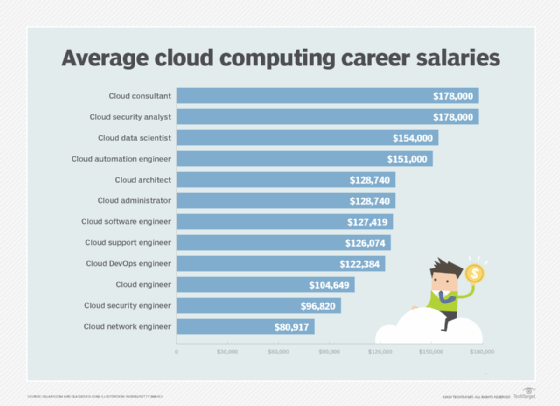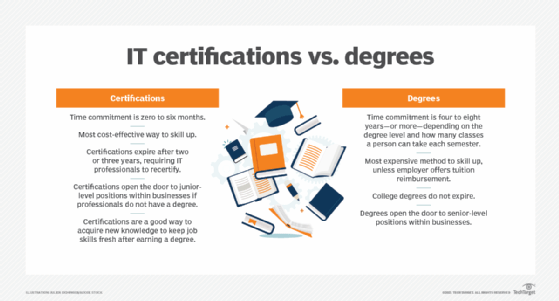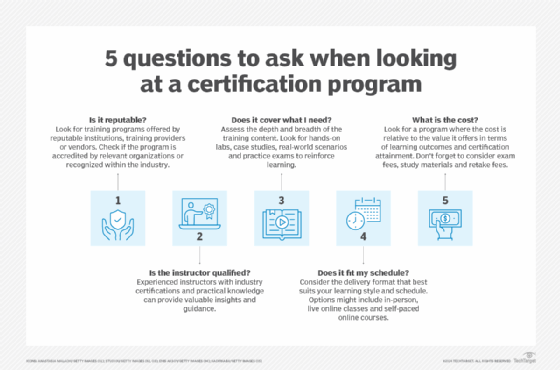What are CPE (continuing professional education) credits?
Continuing professional education, or CPE, credit is a term referring to the points professionals receive for participating in specialized training in IT and other fields. CPE credits are based on hours of study and count toward certification programs that enable professionals to maintain or update their credentials.
Importance of CPE credits
The main purpose of fulfilling CPE requirements and earning CPE credits is to ensure that professionals continue learning and remain current with developments in their industries. Continuing education and certification are crucial for helping employees and their companies be more competitive by adding to the skillsets they can offer.
In some professions, especially in the United States, earning and maintaining a certain number of CPE credits in a specified time period (every year, every three years, and so on) is essential or desirable to maintain a license or certification, ensure career progression or both.
Examples of such professional fields include the following:
- IT.
- Accounting.
- Real estate.
- Dentistry.
- Law.
- Insurance.
- Healthcare.
- Pharmacy.
- Psychology.
- Teaching.
Organizations involved in continuing education programs for IT-related jobs include CompTIA, the Project Management Institute, International Information Systems Security Certification Consortium ISC2) and Information Systems Audit and Control Association (ISACA), among others. These organizations often team up with colleges, trade schools and companies to help professionals earn CPE credit hours.
In some professions, recertification is required because certain certifications can expire. For example, CompTIA provides several IT certifications that can expire, such as CompTIA A+, CompTIA Data+, CompTIA DataSys+ and CompTIA Network+.
Certificate-holders must complete CompTIA's CE (CPE) program to remain certified. They can also renew the certification by earning a higher-level CompTIA certification. Similarly, those who hold the Project Management Institute's (PMI) Project Management Professional (PMP) certification must earn a certain number of CPE credits (known as PDUs) to renew and retain their certification.
CPE terminology
These are alternative terms for CPE credits:
- Continuing Education Units (CEU).
- Continuing Education Credits (CEC).
In addition to CPE, CEU and CEC, some credentialing bodies and licensing boards use their own terminologies to refer to CPE credits. Two common terms are contact hour and continuing education hour, where hours determine the time spent by the student in CPE classes or training provided by a qualified instructor and/or in completing certain qualifying activities.
Learners must complete a certain number of hours to earn the number of credits required for certification (and in some cases, recertification). Sometimes, a learner can earn one credit for completing one hour of CE, meaning 1 contact hour = 1 CPE. ISC2 is an example of a certifying authority that allows learners to earn one CPE credit per hour of time spent on an activity (although some activities are worth more credits than others). With other authorities or courses, learners might need to complete more hours to earn credit (e.g., 10 contact hours = 1 CPE).
Who needs CPE credits in IT?
Generally, IT professionals must complete a certain number of credit hours to obtain a specific CPE certification -- regardless of whether they are pursuing the certification as a company mandate or on their own. The number of credit hours required depends on the specific IT field.
CPE qualifications for IT are available across various fields for learners with skills ranging from entry-level to intermediate to advanced. Learners might be at any stage of their career, from rookies to mid-level to senior/managerial/executive level. For example, new entrants to the IT field can pursue CompTIA's A+ certification, while experienced cybersecurity practitioners can pursue CompTIA's CASP+ certification.
Benefits of CPE credits in IT
As a stepping-stone to receiving certificates, CPE credits are important for IT (and other) professionals. Some companies require their IT staff to consistently earn CPE credits to be eligible for promotions, while for others, CPE credits (and CPE in general) are just a nice-to-have. Regardless, CPE credits can help IT specialists differentiate themselves from their peers and advance their chosen careers.
One main benefit for certified IT professionals and professionals who pursue CPE credits is higher salaries. Professionals with certifications in emerging or in-demand fields, like artificial intelligence (AI), data science, cloud computing or cybersecurity, can earn very high salaries in many countries, including the United States.

Regularly earning CPE credits can also facilitate new career opportunities, such as new connections, promotions and new jobs.
Another benefit of certification and CPE credits is improved job performance. Professionals who engage in continued education and maintain their certifications generally tend to deliver better-quality work since they have more up-to-date skills, are more competent, and make fewer errors.
Examples of certifications and CPE credits in IT
Strictly speaking, rookies with almost no work experience (in IT or any other field) cannot be said to be pursuing CPE or earning CPE credits. That said, certifications and credentials are available that can help them begin an IT career and take the first step toward CPE.

Some of the most popular certifications for IT beginners include the following:
- CompTIA A+.
- CompTIA Network A+.
- Cisco Certified Network Associate (CCNA).
- Microsoft Certified: Azure Fundamentals.
- AWS Certified Cloud Practitioner.
- Microsoft 365 Certified: Modern Desktop Administrator Associate.
- GIAC Information Security Fundamentals (GISF).
- Certified Associate in Project Management (CAPM) -- suitable for entry-level project management positions for both IT and non-IT professionals.
Mid-level and experienced IT professionals can earn CPE credits and/or certifications to advance their careers, such as the following:
- ISC2 Certified Information Systems Security Professional (CISSP).
- ISC2 Certified Cloud Security Professional (CCSP).
- CompTIA PenTest+.
- Professional Scrum Master.
- AWS Certified Solutions Architect -- Associate.
- ISACA Certified Data Privacy Solutions Engineer (CDPSE).
- ISACA Certified Information Security Manager (CISM).
Furthermore, CPE credits and the resultant qualifications are available for both, established disciplines and emerging technologies.
Examples of CPE courses and credits for established disciplines include the following:
- Software development/programming.
- Information security.
- Database management.
- Networking.
- Hardware.
- Cloud computing.
- Cybersecurity.
Examples of CPE courses and credits for emerging disciplines include the following:
- AI.
- Machine learning.
- DevOps.
- Mobile app development.
- Internet of things (IoT).
- Blockchain.
- Data science and big data.
How to earn and claim CPE credits
The type of continuing education provided and how it is conducted usually determines the number of CPE credits awarded. CPE includes programs such as training workshops, conferences, in-person and online classes and webinars. Serving on industry boards, self-study, submitting an article in the field and volunteer work (such as mentoring a student) might also help professionals rack up CPE credits.
Some training and certification organizations allow IT professionals to test their knowledge and accumulate CPE credits in various IT fields by taking online quizzes. For example, ISC2 publishes every two months a 10-question ISC2 Insights CPE Credit Quiz. Each quiz is based on some of the longer-read editorial content on the ISC website, such as opinion and feature articles. On successfully passing the quiz, the learner can earn two CPE credits, which are automatically added to their total.
Some certifying organizations require learners to report their earned CPEs to the organization within a certain period. Examples include ISACA and ISC2.
Cost of CPE and CPE credits
Some certifications and CPE recertifications can be expensive, although the cost varies by certification type, level, and certifying organization. Some employers pay for earning CPE credits, which may include the cost of classes.
Some training/certifying bodies offer discounts on training. For instance, SANS has a work-study program that allows professionals to attend SANS' training sessions at a discounted tuition rate in exchange for providing teaching assistance on online and in-person training courses.
Who offers CPE credits?
In addition to training organizations and certifying bodies, industry associations, colleges, vocational schools, and private companies also provide training for CPE credits. Before beginning training, professionals should research the organization that will be providing the credits and ensure those credits can count toward their required professional education. How strict standards are varies in different IT fields.

To know if their training qualifies for CPE credits, professionals can use applications such as CompTIA's CEU assessment tool before submitting their training activity for CEUs. This tool helps determine if the CE activity meets program requirements for certification renewal. It looks for the completion date, documentation, and relevance of the course content to the exam objectives for the certification being renewed.
What is continuing professional education (CPE)?
Continuing professional education refers to the courses that some professionals undertake while they are working. The goal is to maintain the relevance of their existing skills or to add new skills to their existing skillset. As they complete courses delivered by accredited or industry-recognized organizations, they earn points known as CPE credits.
Ongoing CPE can be a mandatory requirement in certain fields (and in certain countries). If the professional fails to meet the CPE credit requirements of their profession or organization in a reasonable time frame, their certification might be revoked.
CPE programs vary in length, although some are relatively short and might be focused on a general refresher of professional competencies or an overview of a new technology, practice or skill. Additionally, some IT certification programs allow a certain portion of the candidate's CPE units to come from other fields.
Requirements to earn CPE credits and maintain certifications
CPE credit requirements vary by certification. For example, IT pros with ISACA certifications, such as CISA, Certified Information Security Manager (CISM), Certified in the Governance of Enterprise IT (CGEIT) or Certified in Risk and Information Systems Control (CRISC), are required to obtain 120 CPE credits over three years, with a minimum of 20 CPE required annually. They can do so in the following ways:
- Attending ISACA conferences (up to 32 CPE).
- Participating in webinars and online training (up to 36 free CPE per year).
- Completing on-demand courses (up to 28 CPE per course).
- Participating in skills-based labs (up to 32 CPE per lab).
- Performing volunteering activities (up to 20 free CPE per year).
After earning CPEs, learners must report them to ISACA by logging into their ISACA account.
Similarly, ISC2 requires that professionals earn CPEs during their three-year certification cycle and then submit those CPE credits via ISC2's CPE portal. The number and types of CPEs (Group A or Group B) differ by the certification/designation type. For example, Associate certifications require at least 15 CPEs per annum from Group A, while the CISSP certification requires at least 40 CPEs per annum and at least 120 CPEs over 3 years from both Group A and Group B.
ISC2's Group A CPE credits are earned from domain-related activities, such as the following:
- Reading a white paper.
- Publishing an article.
- Attending an ISC2 conference.
- Taking an ISC2 course.
- Preparing for a presentation or teaching information related to the course.
- Completing a unique work-related project that is not a part of an individual's normal duties.
- Self-study related to research for a project.
- Preparing for a certification examination.
- Volunteering for government agencies, the public sector, or charitable organizations;
- Taking a higher academic course in that field.
Group B credits are earned by completing general professional development activities, such as the following:
- Attending a conference or educational course.
- Preparing for a presentation or lecture.
- Volunteer activities such as teaching.
IT professionals can further their skills through degree programs and certifications. See if IT certifications or degrees are better for your career.